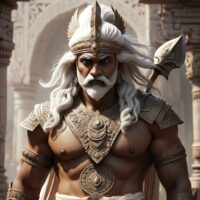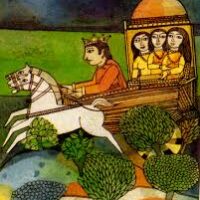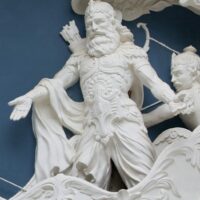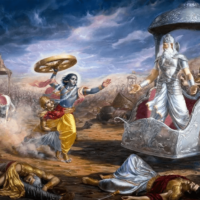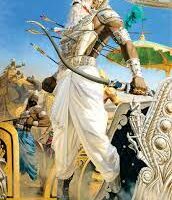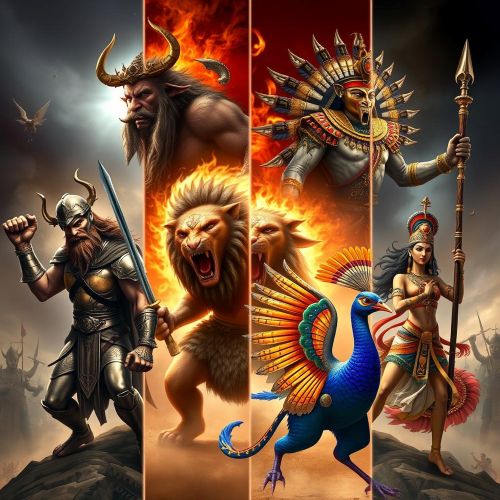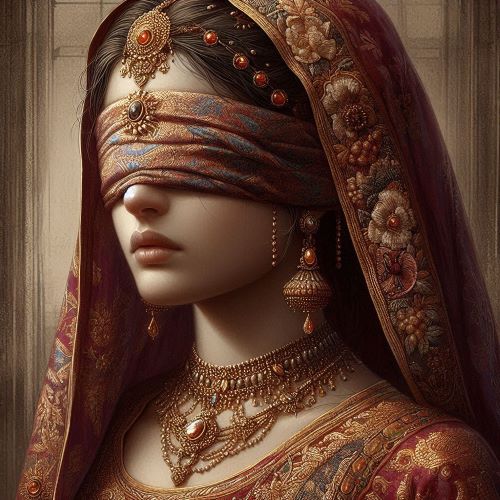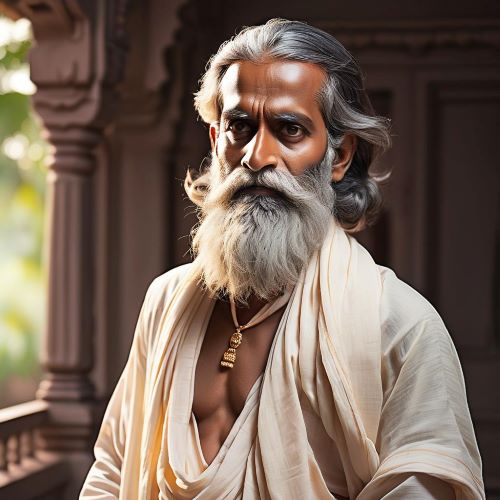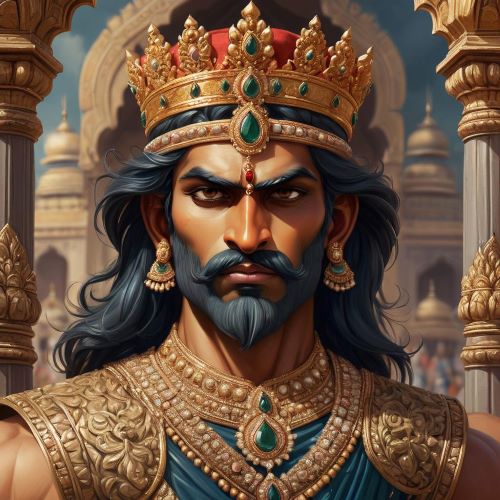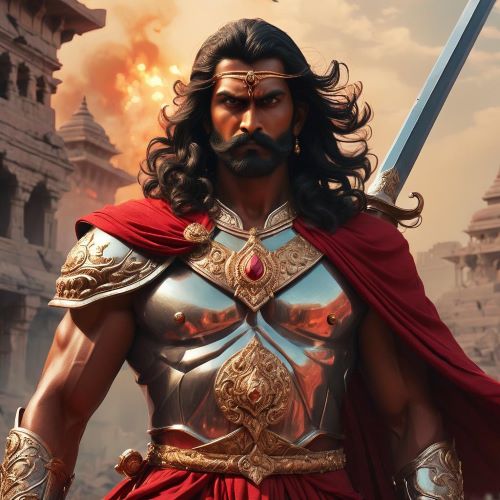Bheeshma : The Grandfather
Listen
At a glance
| Description | |
|---|---|
| Origin | Indian Mythology |
| Classification | Mortals |
| Family Members | Shantanu (Father), Ganga (Mother) |
| Region | Indian |
| Associated With | Warfare, Oaths, Royalty |
Bheeshma
Introduction
In the rich tapestry of Indian mythology, few characters are as revered as Bheeshma. Known for his unyielding dedication to duty and unassailable valor, Bheeshma remains a central figure in the epic Mahabharata. His life exemplifies loyalty, sacrifice, and the complexities of honor in the face of moral dilemmas. Born as the eighth son of Ganga, he was granted immortality by a boon from his father, Shantanu. His story highlights the intricate interplay of familial obligations, personal desires, and the profound impact of choices on one’s destiny. Also known as Pitamaha, Gangaputra, and Devavrata, Bheeshma was a prince and commander of the Kuru kingdom. He played a pivotal role in the Mahabharata and was the supreme commander of the Kaurava forces during the Kurukshetra War, witnessing the entire saga from his father King Shantanu’s reign to the war itself.
Physical Traits
Descriptions of Bheeshma in ancient texts often portray a physically imposing figure with a commanding presence. His appearance was marked by a serene and dignified demeanor, reflecting his inner strength and resolve. As a formidable warrior with fair skin, his name, which means “terrible” or “fierce,” mirrored his unwavering commitment to a vow of lifelong celibacy. Blessed with icchamrityu, he had the ability to choose the time of his death. Bheeshma, also known as Bhishma or Bhishma Pitamaha, was characterized by his striking appearance and regal demeanor. His towering stature and white hair, which earned him the epithet “Pitamaha” meaning grandparent, along with his piercing gaze and commanding presence, marked him as a formidable warrior and leader among men.
Family
Bheeshma’s lineage is as illustrious as his character. He was born to Ganga, a celestial river goddess, and King Shantanu of Hastinapur. His birth involved divine intervention, as Ganga immersed her first seven sons in the river to absolve them of their sins. When Shantanu wished to marry Satyavati, a fisherman’s daughter, Bheeshma vowed celibacy and perpetual warfare to ensure Shantanu’s lineage continued, solidifying his reputation for unparalleled devotion. Raised as Devavrata, he was the eighth son of Shantanu and Ganga, marked by a divine prophecy for greatness. His stepbrother was the sage Vyasa, who significantly shaped the Mahabharata. Bheeshma raised both the Pandavas and the Kauravas, ruling from the background as the patriarch of the Kurus, his life deeply intertwined with the events leading up to the Kurukshetra War.
Other names
Bheeshma was known by various names that reflected his character and deeds. His birth name, Devavrata, signified his vow of eternal celibacy and unwavering commitment. The name Bhishma, derived from “Bhisham” meaning terrible or fearsome, highlighted his prowess and formidable presence in battle. Additionally, he was referred to as Bhishmadev, Bhishma Pitamah (Grandfather Bhishma), and Ganga Putra (Son of Ganga), emphasizing his revered status and the deep respect he commanded. Other epithets include Gangaputra (Son of Ganga), Gaurānga (One with a fair body), Shvetaveera (White warrior), and Shantanava (Son of Shantanu).
Powers and Abilities
Bheeshma’s prowess in warfare was legendary, unmatched by few in his time. Trained extensively in martial arts by celestial masters, he mastered various weapons such as the bow and arrow, sword, axe, gada (mace), and spear. His skill and strategic acumen on the battlefield were unparalleled, making him one of the greatest warriors of his era. Despite his defeat by Arjuna, Bheeshma’s resilience was demonstrated by his choice to lie on a bed of arrows, awaiting the propitious moment of his death. Beyond his martial abilities, Bheeshma was renowned for his profound knowledge of Dharma (righteousness) and his ability to navigate complex moral dilemmas, earning him respect as an authority among kings and sages alike.
Modern Day Influence
Bheeshma’s enduring legacy continues to resonate in contemporary society, inspiring individuals striving for excellence in their personal and professional lives. His embodiment of ‘dharma’, or righteous conduct, remains a guiding principle across various facets of life. In Hinduism, Bhishma’s reverence persists, marked by the observance of his death anniversary, Bhishma Ashtami, celebrated on the eighth lunar day of the Shukla half of the Magha month (January–February). Beyond religious observances, Bheeshma’s character has inspired artists, writers, and filmmakers, who have adapted his story into various media, broadening his legend’s reach. Themes such as duty, sacrifice, and familial relationships explored through Bheeshma’s life continue to provoke thought and discussion, making his tale a perennial source of contemplation in Indian culture.
Related Images
Frequently Asked Questions
What is lorem Ipsum?
I am text block. Click edit button to change this text. Lorem ipsum dolor sit amet, consectetur adipiscing elit. Ut elit tellus, luctus nec ullamcorper mattis, pulvinar dapibus leo.
What is lorem Ipsum?
I am text block. Click edit button to change this text. Lorem ipsum dolor sit amet, consectetur adipiscing elit. Ut elit tellus, luctus nec ullamcorper mattis, pulvinar dapibus leo.
What is lorem Ipsum?
I am text block. Click edit button to change this text. Lorem ipsum dolor sit amet, consectetur adipiscing elit. Ut elit tellus, luctus nec ullamcorper mattis, pulvinar dapibus leo.
What is lorem Ipsum?
I am text block. Click edit button to change this text. Lorem ipsum dolor sit amet, consectetur adipiscing elit. Ut elit tellus, luctus nec ullamcorper mattis, pulvinar dapibus leo.
What is lorem Ipsum?
I am text block. Click edit button to change this text. Lorem ipsum dolor sit amet, consectetur adipiscing elit. Ut elit tellus, luctus nec ullamcorper mattis, pulvinar dapibus leo.

